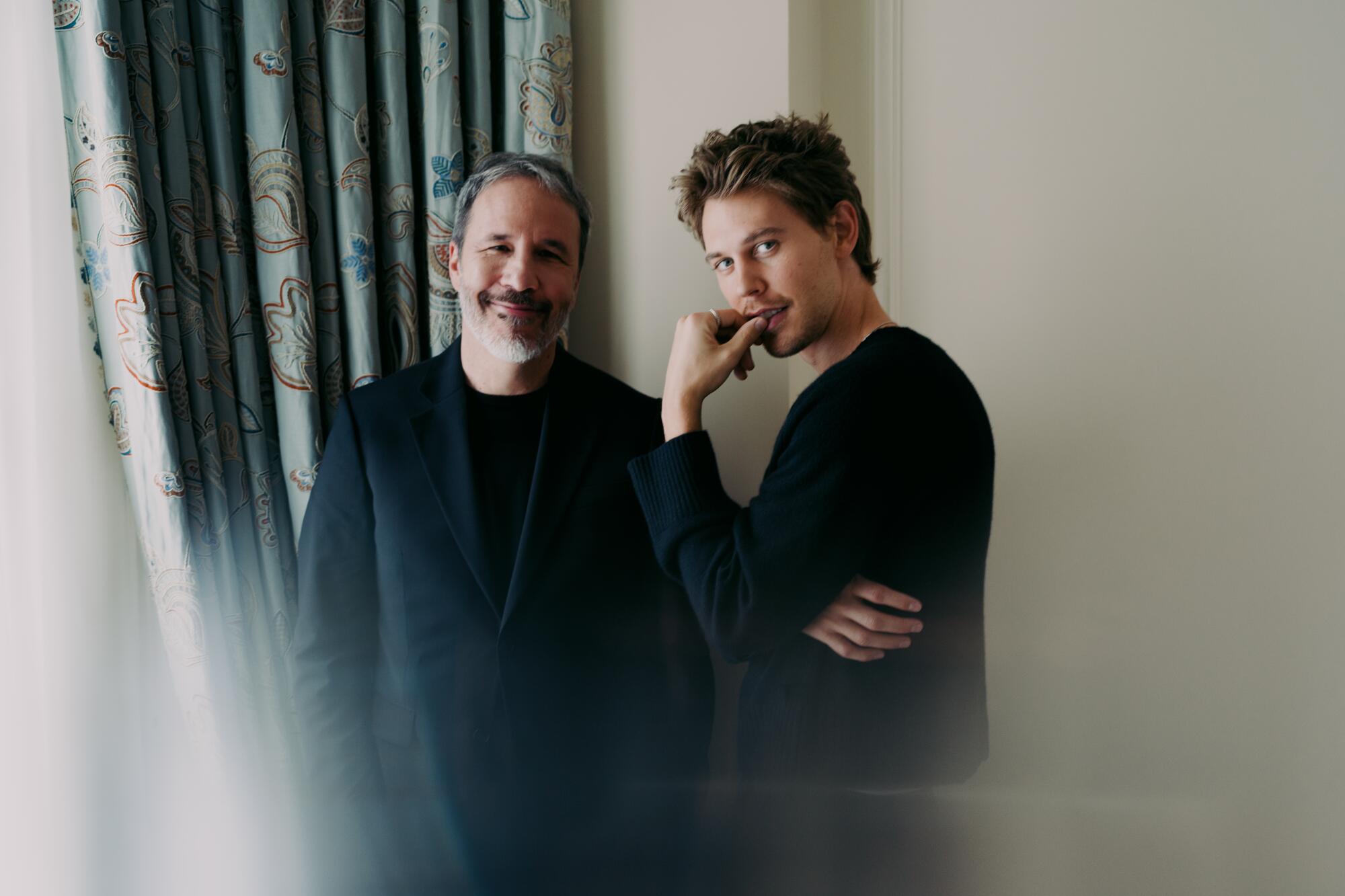
- Share via
When director Denis Villeneuve’s sand-swept sci-fi epic “Dune” hit theaters in 2021, fans of Frank Herbert’s original 1965 novel quickly noted one key character who was missing in action: Feyd-Rautha Harkonnen. A foil to the hero Paul Atreides, the scheming nephew of the villainous Baron Vladimir Harkonnen (Stellan Skarsgård) wasn’t even mentioned.
A “Dune” devotee himself since his teenage years, Villeneuve never had any intention of giving short shrift to Feyd-Rautha, who serves as a kind of dark mirror to the messianic Paul, played in the film by Timothée Chalamet. Quite the opposite. “The idea in the first film was to try to stay as much as possible on Paul’s perspective, to let the reality unfold through his eyes,” he says. “This was why I brought in Feyd-Rautha as late as possible. I loved the idea of keeping some major firepower for the second film.”
In “Dune: Part Two,” which hits theaters March 1, Feyd-Rautha finally receives his much-anticipated introduction, with Austin Butler — hot off his Oscar-nominated turn in “Elvis” — stepping into the role. Memorably, if campily, played by a spiky-haired, winged-codpiece-wearing Sting in director David Lynch’s misbegotten 1984 adaptation, Feyd-Rautha here is transformed into something far more disturbing: a ghostly, hairless killer whose psychotic ruthlessness matches his ambition to rule the desert planet Arrakis.
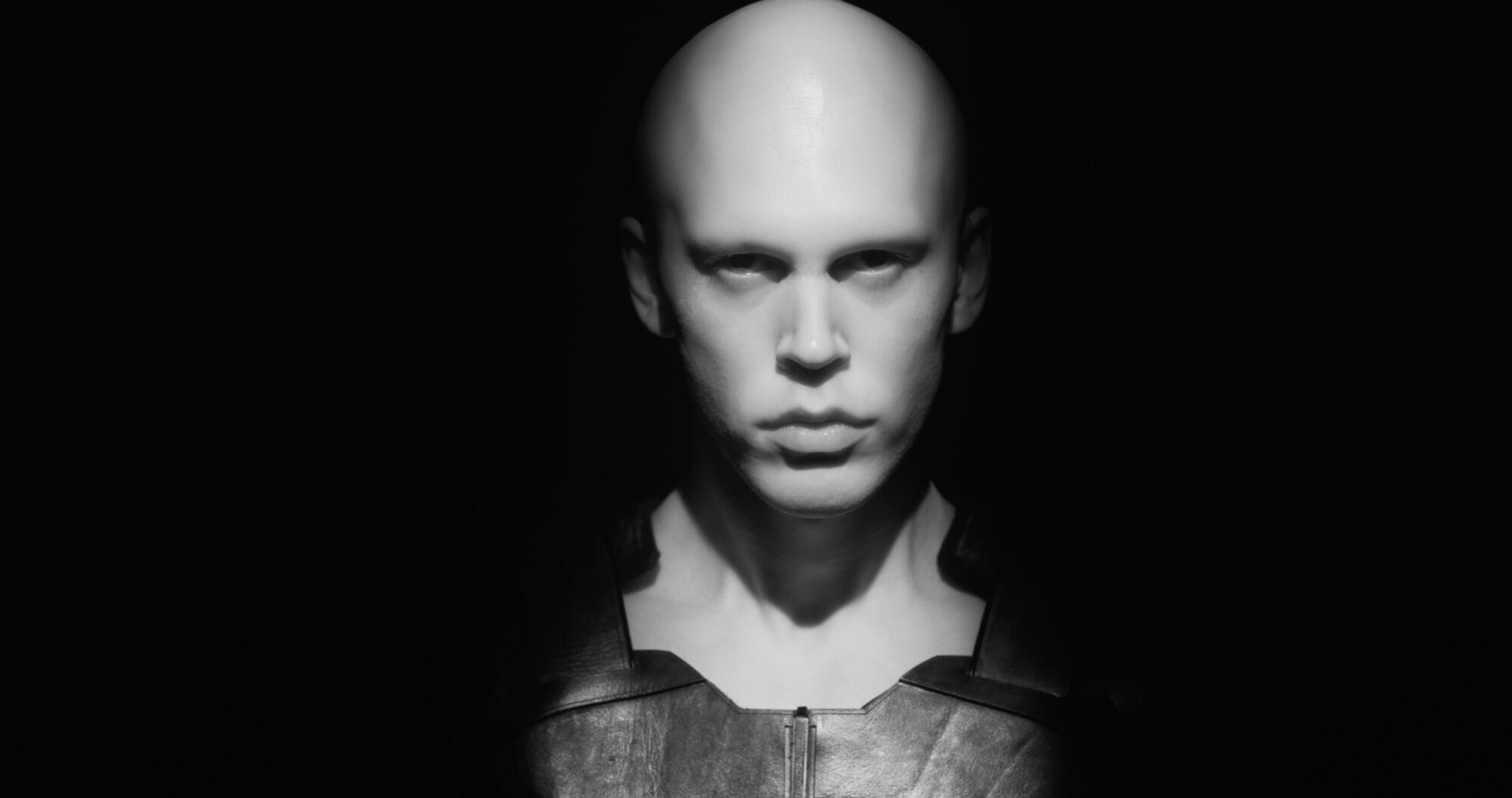
One of the Great Houses vying for dominance in the sprawling “Dune” universe, the Harkonnens are a cunning and savage people who prize strength above all, with Feyd-Rautha plotting to replace his older brother Rabban (Dave Bautista) and perhaps the Baron himself. In the second “Dune” installment, we see much more of their violent, dystopian planet of Giedi Prime, which orbits a black sun. Villeneuve and cinematographer Greig Fraser present the Harkonnen world in stark black-and-white, a contrast to the noble Atreides’ verdant home planet of Caladan and the desolately beautiful Arrakis inhabited by the fierce and resilient Fremen.
“The goal was to capture that feeling that you are in a different space and time,” says Villeneuve, who worked with returning screenwriter Jon Spaihts to distill the novel’s expansive narrative to its essence. “I really wanted to dive more into the Harkonnen culture and Feyd was my principal vehicle to be able to go deeper.”
A would-be heir to the throne who killed his own mother, Feyd-Rautha, bald and eyebrow-less with black teeth and eyes like a shark, is particularly bloodthirsty in his pursuit of power. Among the film’s major set pieces is a gladiator battle in which Feyd-Rautha, who seems to take a kind of sexual pleasure in inflicting pain, shows off his knife-wielding abilities and his coldheartedness — a pivotal moment in his rise to consequence.
The Times spoke with Villeneuve and Butler over Zoom from Paris about the challenges of bringing one of sci-fi literature’s most famous baddies to life on the screen, the thrill of playing against type and why baldness is sexy (at least if you’re a Harkonnen).
Denis, “Elvis” was not even out yet when you cast Austin. What had you seen of his work that gave you the confidence he could play a character like this?
VILLENEUVE: I had first seen Austin in [Quentin Tarantino’s 2019] “Once Upon a Time … in Hollywood,” and I was impressed with the way he handled that kind of wannabe dark and villainous character [of Manson Family member Tex Watson]. Then [director] Baz Luhrmann shared with me some clips from “Elvis” and I was absolutely blown away. To portray such an icon as The King and be able to disappear into the character — I needed that kind of actor. Feyd needed to be that kind of charismatic figure with a strong sex appeal. And I knew Austin had that.
Did I know that Austin would be able to go that dark? I was wishing. But when we started to do the first camera tests, it was an explosion of joy for me because it was beyond my expectations.
Austin, what drew you to this?
BUTLER: I had seen every one of Denis’ films, and he was at the very top of my list of my dream directors. I remember watching the first film and just thinking, “This is an absolute masterpiece. I would die to be in something like this.” I had read “Dune” when I was 15 and I reread it when I knew I was going to be meeting with Denis, and I saw it through completely new eyes.
To be able to play a character like Feyd is such a gift as an actor, to have that kind of freedom. And at that point in my career, to do something that was so different from anything I’ve done before gave me something to really sink my teeth into.
Stirring and sublimely epic, the conclusion to Denis Villeneuve’s atmospheric first half climaxes with a showdown between Timothée Chalamet and Austin Butler.
Director Alejandro Jodorowsky had hoped to cast Mick Jagger as Feyd-Rautha in his never-realized adaptation. David Lynch cast Sting in the role. Now we’ve got a guy who embodied Elvis. What is it about the character that seems to draw rock-star types?
VILLENEUVE: There’s something there, it’s true. Watching Austin as Feyd, I kept saying to myself, “He makes me think of Mick Jagger. He has that swagger and arrogance. When he walks in the room, all the attention turns around him.” I had forgotten that Jodorowsky’s plan was to cast Mick Jagger. That would have been a very interesting choice.
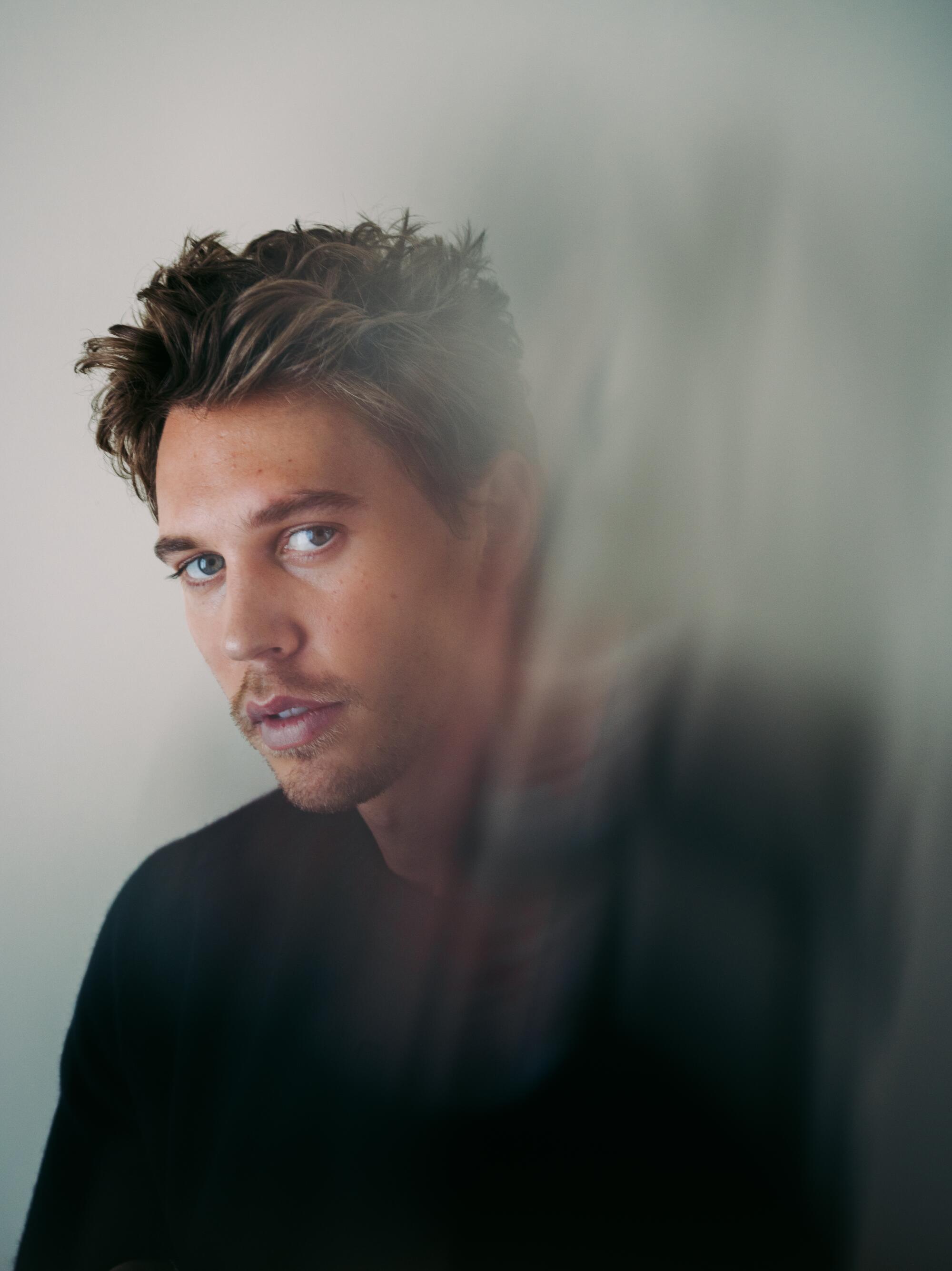
The Feyd-Rautha we see in the movie is less chatty and more frightening and animalistic than in the book. How did you arrive at his look and physicality?
BUTLER: In our first conversation, we talked about him being physically imposing. The strength of Feyd makes Paul stronger and vice versa — it’s like playing the greatest tennis pro that you possibly can. For me that meant putting on weight and learning knife-fighting, so I worked with a kali [sword] instructor for months before I ever got to Hungary.
It was about finding the brutality and making him as vicious as possible. I spent a lot of time daydreaming about what it would be like to grow up in that environment with the Baron as your father figure. Learning about cultures throughout time that have had this brutality brought it to a human place where I realized: I’m not just playing someone you can write off as psychotic and evil. I had to see through his eyes.
VILLENEUVE: The thing with him being less chatty — it’s the same with the Baron. I will say that the thing that I felt didn’t age well in the book is the Harkonnen. I wanted them to be threatening and dangerous and taciturn, and less talkative and mustache-twirling.
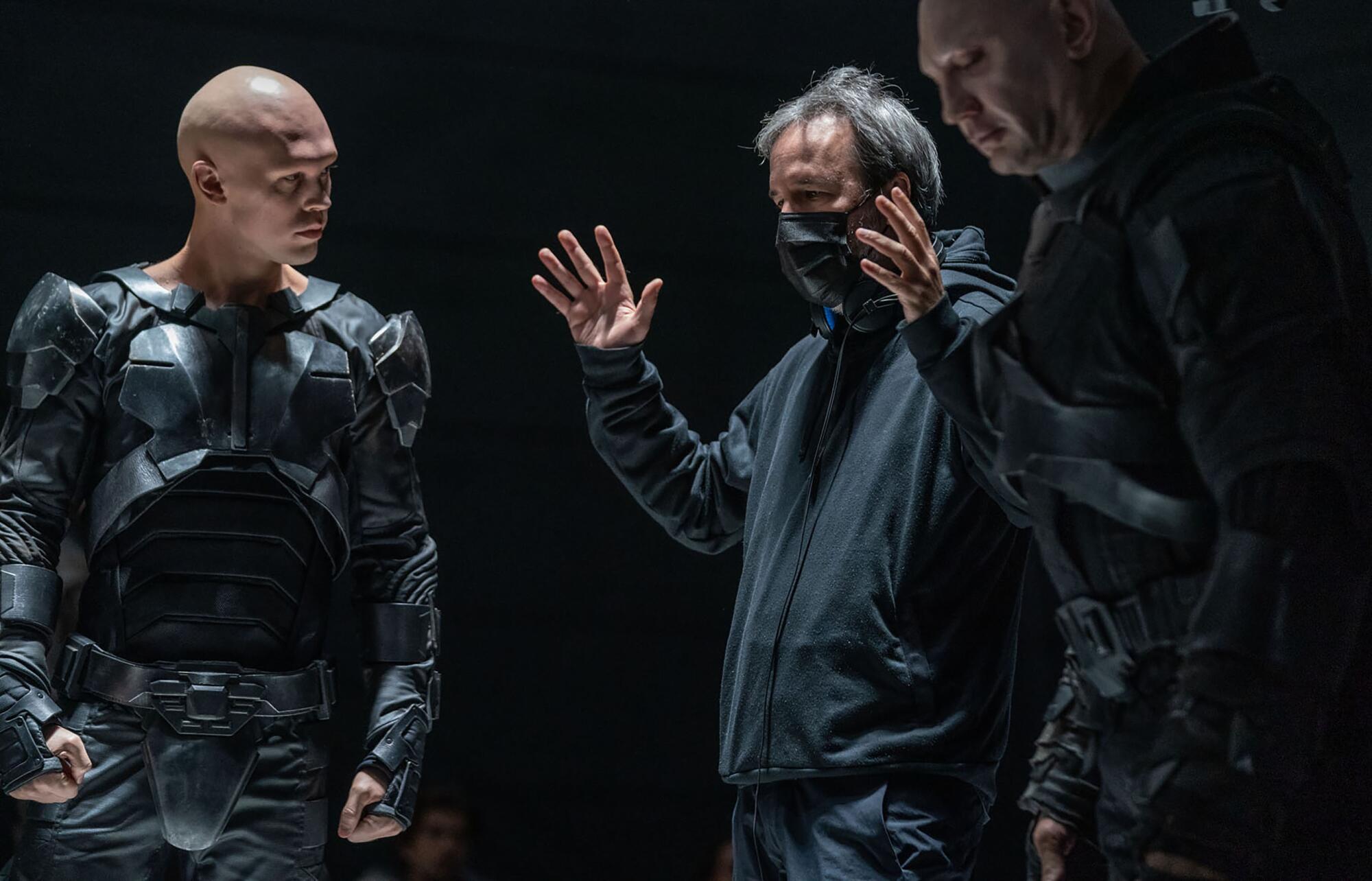
The book delves more deeply than the film into the power struggle within the Harkonnen family, including a plot by Feyd-Rautha to assassinate the Baron. How did you decide how much of that palace intrigue to include and what to leave out?
VILLENEUVE: As you know, the “Dune” books are very dense. I wanted to keep that paranoid tension in the family, that they cannot trust each other, but I wanted just enough so you can feel it and understand it without having to dive into too much exposition. I tried to have a movie that would be as visceral as possible. We can see that it’s not a very functional family. [Laughs] I think that when my mother sees the movie, she will understand that the Harkonnens’ Christmas must be a bit hardcore.
Typically if you’re a studio executive and you’ve got a star like Austin in a big-budget movie, you don’t want him to be bald, monstrous and unrecognizable. Was that ever a concern?
VILLENEUVE: No. If I had been Austin’s friend, I would have been like, “Do it. You have to pull yourself out of Elvis.” It was a total transformation. He looks nice and gentle now. But when the camera was on him, his aura was shifting, his eyes were different, his voice was different. There was a shift of persona that was phenomenal for me to see. It was like discovering a new species of animal.
We tried to go as close as possible to the limit of being too far. There’s a lot of sensuality there. I think that the Harkonnen are trying to be as disconnected from nature as possible. Their world is an artificial, plastic world. I like to think that, for them, hair is vulgar, and to remove everything and become hairless is sexy for them.
Some of my friends on the team and I used to say: If there’s a party, you want to be on Giedi Prime. That’s where the party is.
BUTLER: We had most amazing hair and makeup team. I almost don’t want to speak on it too much because I don’t want to take the mystery away from it. But it’s such a gift as an actor to look in the mirror and not see yourself because you can completely just suspend disbelief and enter into that world.
There’s no trace of Elvis in Feyd’s voice but there is a lot of Stellan Skarsgård. Are you imitating him? How did you find your way to a version of the Baron’s voice?
BUTLER: There was a period where I just thought I’d use my own voice but something felt too contemporary about it. Then one night it dawned on me that Feyd grew up with the Baron as his vision of power and something sparked in me. I said to Denis, “What do you think of this?” He said, “Let me go home and dream on it.” The he came back the next day and said yes.
That ended up being such a key for me because our voice is the fingerprint of our soul in a way. It changes the rhythm of how you think and how you breathe. So much of that locked in for me when I started finding that voice.
How did you establish the right chemistry with Timothée Chalamet? Austin, had you two ever met before this?
BUTLER: We knew a lot about each other and we have mutual friends and colleagues. But the first time that we met was in Hungary in the stunt-rehearsal room. We basically said hello and then got down to work on the fight, trying to kill each other.
VILLENEUVE: [Laughs] That’s the best way to meet. The thing is, we did some readings by Zoom because everybody was all over the planet and I wanted to hear the words just before locking everything. And I did feel that there were some sparks between both actors. And I mean, they’re professional. It’s their job to get along.
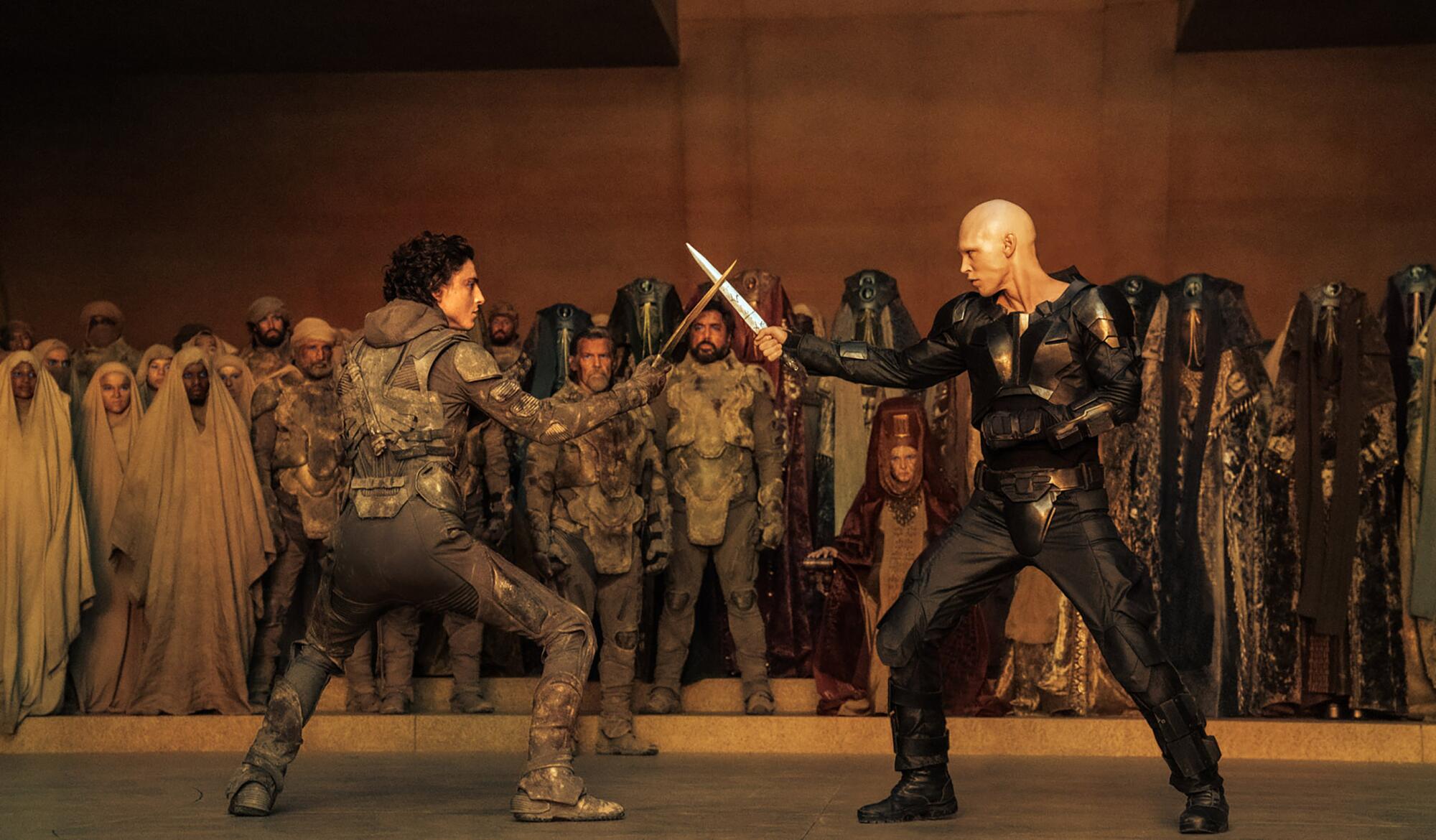
Austin, are you the kind of actor who, if you’re playing a dark character like this, you have to stay in a dark place even when you’re not shooting?
BUTLER: I’ve definitely in the past, with “Elvis,” explored living within that world for three years and that being the only thing that I think about day and night. With Feyd, I knew that that would be unhealthy for my family and friends.
VILLENEUVE: And for me! [Laughs]
BUTLER: And you. So I made a conscious decision to have a boundary. It allowed for more freedom between action and cut because I knew I was going to protect everybody else outside of the context of what we were doing. That’s not to say that it doesn’t bleed into your life. But I knew that I wasn’t going to do anything dangerous outside of that boundary, and in a way that allowed me to go deeper, I think.
VILLENEUVE: Working with you was tremendously playful. When the camera was on, it was like you were possessed. When the camera was off, you were still maybe 25 or 30% Feyd. Just enough to still be present and focus but removed enough that you didn’t kill anybody on set.
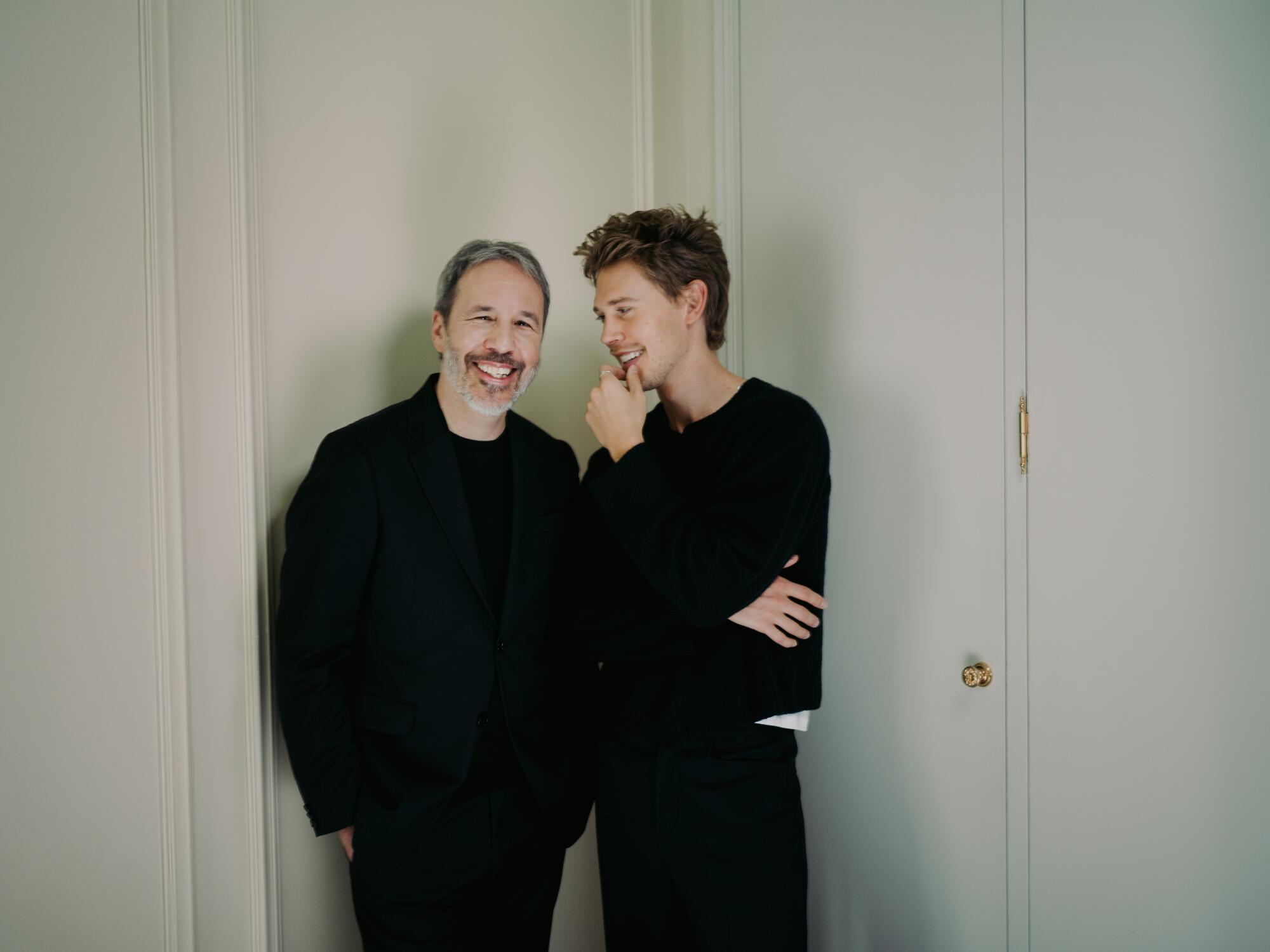
Without spoiling anything, the ending of this movie points toward a larger story that continues in the subsequent book, “Dune Messiah.” Denis, after making these two massive films, do you feel like you’re still not done with the “Dune” universe?
VILLENEUVE: When I embarked on the “Dune” journey, I proposed that it could be three movies. I absolutely love “Dune Messiah” and that is in the works. When people ask me, “After ‘Dune Messiah’ will you be done with ‘Dune’?” I say yes because at that point it will have been almost 10 years of my life. It’s healthy to think that there’s an end to this. But one thing at a time. After “Dune Messiah,” ask me again and we’ll see.
This interview has been edited and condensed.
More to Read
Only good movies
Get the Indie Focus newsletter, Mark Olsen's weekly guide to the world of cinema.
You may occasionally receive promotional content from the Los Angeles Times.












